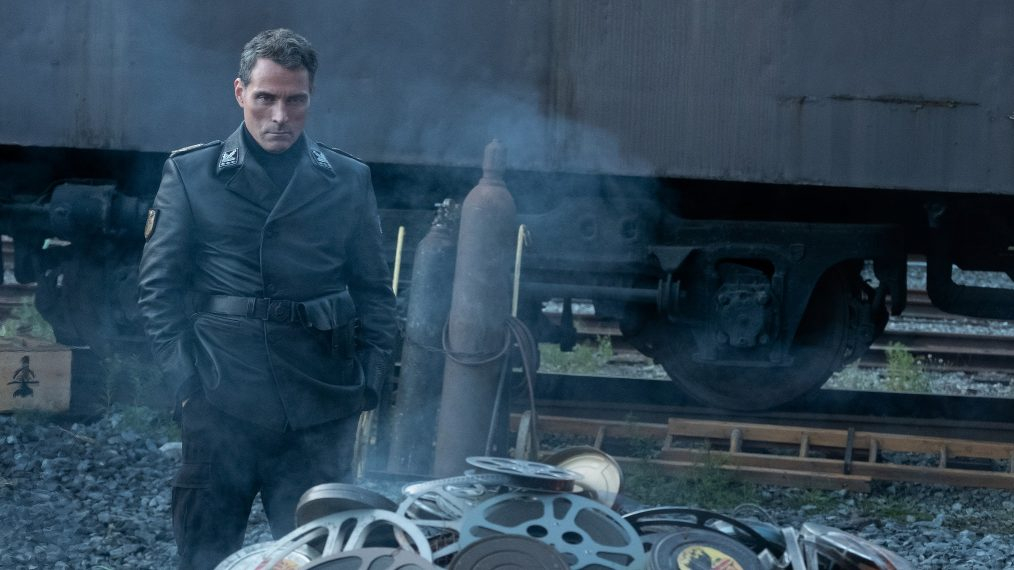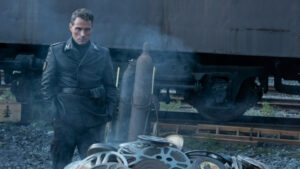

Rufus Sewell stars as John Smith, a reichsmarshall for the American Reich.
Ollie Gratzinger | Editor-in-Chief
11/20/19
Amazon Studios’ flagship sci-fi thriller, The Man in the High Castle has raised the stakes once again in its fourth and final season, which hit the streaming platform on Nov. 15. Some storylines reached their conclusions with an eloquence that neatly wrapped up four years of production, while others struggled to find footing amid increasingly complex plotlines and character arcs. But overall, the Emmy-nominated series offered viewers a bittersweet ending with no real winners and no sweet victories — which is really the only way a series based on a Phillip K. Dick novel could end.
Season 4 introduces a handful of new characters and organizations, including the titular Black Communist Rebellion (BCR), fronted by charismatic and kind-hearted Equiano Hampton (David Harewood). With every other character lamenting the loss of freedom after the Nazis occupied the U.S. in 1946, the BCR’s characters remind that not everyone was free to begin with. Protagonists Bell (Frances Turner) and Elijah (Clé Bennett) are a wonderful and important addition to the show, and their acting is phenomenal.
As much as I like the BCR plotline, it feels like something that should’ve been introduced sooner, because so much happens so quickly that one season simply isn’t enough to do it justice; there isn’t enough time to fall in love with the characters and see them through the same ups and downs that other protagonists were granted. It all just…happens, and the rest of the season seems to follow suit.
Lead protagonist Juliana Crain (Alexa Davalos) finds herself in the Alt-World, a realm of existence in which the Allies won World War II after all and life had progressed accordingly. She was nursed back to health by an alternate version of John and Helen Smith (Rufus Sewell and Chelah Horsdal), along with their son, Thomas (Quinn Lord). In Juliana’s reality, John Smith is a high-ranking, cold and calculating Nazi Reichsmarshall, and Helen, his faithful Reichsfrau. Thomas had been killed off in the second season, but in the Alt-World, he’s very much alive. Alt-Smith is a traveling salesman who hates war, and Helen is a churchgoing woman with a heart of gold.
But a series of events remind Juliana that she can’t run forever; she has business to tend to in her world. Someone has to kill Reichsmarshall John Smith, and she knows it has to be her.
Juliana’s character is somewhat arid and incomplete; her goal in seasons past had been to avenge the death of her sister. Once that fell through, her mission was to defend the enigmatic films produced by Hawthorne Abendsen, The Man in the High Castle (Stephen Root). But with no further mention of her sister, Abendsen in Nazi custody and the majority of the films destroyed, it feels like Juliana has lost her purpose, as well as her empathy, which was a large part of what made her character so compelling.
Understandably, she’s traumatized and embittered by an overwhelming sense of loss, after the death of basically everyone she’s ever loved, often by her own hand. But her character feels like just that: a character, somewhat lacking in depth.
Oddly, there was no sign of Ed McCarthy (DJ Qualls), Juliana’s best friend who had run off with his cowboy lover Jack (James Neate) at the end of Season 3. He isn’t mentioned and he gets no screen time; it’s implied that he stayed in the Neutral Zone with Jack after his traveling companion Robert (Brennan Brown) returned to San Francisco, but did he live happily ever after? As the Reich advanced into the Neutral Zone throughout Season 4, is Ed safe?
He was one of the only openly queer characters on the show — the other had no season 4 appearances, either — and in not following his story through to the end, it sort of felt like Amazon was pandering to LGBTQ+ fans, showing them that yes, the studio is inclusive and progressive for having a gay character in one of their most popular shows, but they still aren’t willing to give him the time of day.
Moving on, in the Pacific States, controlled by fascist Japan, Chief-Inspector Kido (Joel de la Fuente) is tasked with solving the murder of Trade Minister Tagomi (Cary-Hiroyuki Tagawa), whose death takes place in a flashback. Killing off Tagomi felt like a rushed and impulsive decision, too, with no real build-up or come-down; his death doesn’t motivate the protagonists; it just gives Kido something to do while he battles with his shell-shocked son, Toru (Sen Mitsuji).
Toru’s storyline was one of the strongest parts of Season 4, however; it was the first time in the show that we really see a character actively struggling to cope with what they’ve done in the name of war. Toru, while hailed as a war hero, exhibits all the obvious signs of PTSD, and he can’t seem to shake the ghosts of the battlefield. It adds a layer of realism to the show, and a layer of humanity to the cold-hearted chief inspector.
The Smith family, too, continues to cope with the aftereffects of a different kind of battle; after living in the Neutral Zone for a year to mourn the loss of her and John’s son, Helen returns with their daughters, Jennifer (Genea Charpentier) and Amy (Gracyn Shinyei), and a handful of radical ideas; Jennifer, a young teenager, has learned that the Nazi world she grew up in is guilty and complicit in horror, while her younger sister further embraces fascist ideology. John and Helen have also grown to hate the regime, but a set of dangerous social conventions bar them from being able to do anything about it.
The young actresses are talented and incredible in their roles, and Sewell and Horsdal really deliver in the portrayal of broken and trapped people who once loved each other beyond words, and now, can’t see past the crimes each had been complicit in. The Smith family redefines to the viewer what it means to have sympathy for the devil.
John’s character arc has been one of the most interesting as it unfolds; he goes from loyal soldier to grieving father to shattered man, and many viewers had hoped for some sort of redemption. This, of course, wasn’t possible; it was right of High Castle to avoid the challenge of redeeming a man who committed crimes against humanity. To do so incorrectly would diminish the horrors of what he’d done, so instead, the writer’s room did the next best thing: they made him suffer. A lot. After traveling to the Alt-World himself and discovering what almost was but very suddenly was not, John learns how easy it is to get lost on the road not taken.
The Man in the High Castle was, since its inception, and ambitious show laden with powerful messages and timely societal critiques. None of that has changed with Season 4. The writing was strong and the performances were brilliant, but the show seemed to bite off more than it could chew.
It was good, but it wasn’t great. A few loose ends remained untethered, and answers to questions posed in earlier seasons got lost in the rapid influx of new characters and information. It would’ve been better if they’d just stuck to seeing the arcs they’d started through to the end rather than introducing new plotlines and trying to tie everything together in 10 episodes or less.
Casual watchers will be intrigued by the depth of the story, but for fans who had been on board since the beginning back in 2015, you might be left wanting more — and not in a good way.


